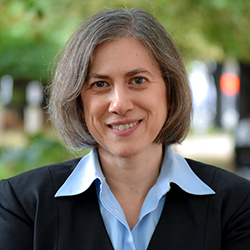Economic Analysis

About Us
The U.S. DOT Volpe Center’s Economic Analysis Division serves transportation leaders who make policy, programmatic, regulatory, and procurement decisions by providing a comprehensive range of economic analysis, impact analysis, industry analysis, and forecasting services—across all modes of transportation.
Our team provides regulatory and financial decision support, evaluation and impact assessment, and travel behavior modeling and forecasting through benefit-cost analysis, econometric modeling, survey research, and interviews and focus groups.
Because our economic, survey research, and evaluation skills have many synergies with engineering, environmental science, information technology, and human factors, our team engages in frequent cross-Center collaboration to provide thorough, multidisciplinary, multimodal analyses and solutions.
We empower transportation leaders, giving them the data, analysis, and forecasting needed to make smart decisions across programs, modes, and Departmental priorities.
We partner with sponsors to provide them the information they need to structure, manage, and evaluate their programs to deliver goals efficiently and equitably.
Our Capabilities
Economic and Policy Analysis
- Provide economic analysis of transportation and related industries.
- Assess the impacts of government policies and regulations upon the transportation sector and the U.S. economy.
- Analyze traveler, consumer, industry, and market impacts, including distribution of benefits and costs.
Impartial Investigations and Program Evaluations
- Analyze issues related to passenger and freight transportation, locally, regionally, nationally, and internationally.
- Address the current performance and future passenger and freight transportation systems, vehicles, modes, and networks to help inform future decision-making.
Research and Surveys Implementation and Analysis
- Gather quantitative and qualitative information on travel preferences, travel behavior, technology purchase and use, and customer satisfaction.
- Create and field surveys, including developing sampling plans, designing survey instruments, and providing data analysis.
- Use structured questionnaires and conduct semi-structured interviews to analyze, probe deeper, and better understand complex topics.
Spotlight On Our Recent Work
- Supported U.S. DOT Office of the Secretary in grant program application reviews (benefit cost and financial) and updated benefit cost guidance to INFRA and BUILD programs
- Administered the 2023 Intelligent Transportation Systems (ITS) Deployment Tracking Survey to freeway, arterial, and transit management agencies nationwide using a new survey methodology. The four reports are published on ROSA P:
- Intelligent Transportation Systems Deployment Tracking Survey: 2023 Key Findings
- Intelligent Transportation Systems Deployment Tracking Survey: 2023 Freeway Management Survey Findings
- Intelligent Transportation Systems Deployment Tracking Survey: 2020 Arterial Findings
- Intelligent Transportation Systems Deployment Tracking Survey: 2023 Transit Management Survey Findings
- Prepared infographics, annual program reports (2020-2024), and executive summaries of completed projects for the Advanced Transportation and Congestion Management Technologies Deployment (ATCMTD) Program: Fixing America’s Surface Transportation Act (FAST Act) - FHWA Operations
Meet Our Team
View selected staff biographies.
 Sari Radin
Sari Radin
Chief
Sari Radin is the U.S. DOT Volpe Center’s chief of economic analysis. Radin leads a team of more than 20 economists and social scientists, supporting major decisions and initiatives through evaluation and impact assessment, travel modeling and forecasting, and regulatory and financial decision support. The Division has expertise in all modes of transportation and frequently leverages knowledge and insights across modes and in support of multidisciplinary teams.
Since starting at the U.S. DOT Volpe Center in 1995, Radin has primarily conducted prospective and retrospective studies and evaluations related to new technology and practice effectiveness, and technology transfer in a market context. She has also conducted formative program evaluations for programs in multiple modes, with a theme being assessment of data availability, quality, and use in decision making.
Before joining the U.S. DOT Volpe Center, Radin conducted analyses in support of program design and infrastructure investment at the Wisconsin Department of Transportation and supported benefit cost and econometric analyses at Resources for the Future. Radin has a BA in economics from Yale University (New Haven, CT) and an MS in economics from the University of Wisconsin-Madison (Madison, WI).
 Evelyn Aaron
Evelyn Aaron
Policy Analyst
Evelyn Aaron is a policy analyst focusing on survey research, program evaluation, and visual information design. Since joining the U.S. DOT Volpe Center, she has supported work for FHWA, FTA, various offices within the Office of the Secretary, and other federal agencies. Aaron’s work covers the full lifecycle of surveys, including design, outreach, analysis, and reporting, to track a wide range of topics, including technology deployment levels, progress toward key performance indicators, and customer satisfaction. Her program evaluation work incorporates a variety of social science research methods, including quantitative and qualitative analysis, interviews, and case research. Aaron advises program managers on program development, techniques for improving data collection, and communications, and she has authored reports and visual products for the Intelligent Transportation Systems (ITS) Joint Program Office (JPO) Deployment Evaluation Program, FHWA Office of Operations for the Advanced Transportation and Congestion Management Technologies Deployment (ATCMTD) Program, and FHWA Federal Lands, among others. Prior to joining the U.S. DOT Volpe Center, she worked in policy advocacy, organizing, and legislative research. Aaron earned her Master of Public Policy from Northeastern University and has a Bachelor of Arts in both political science and applied research from Walsh University (North Canton, OH).
 Jonathan Badgley
Jonathan Badgley
Senior Economist
Jonathan Badgley is an economist focusing on resilience analysis, regulatory and program evaluation, and decision support and benefit-cost analysis (BCA) tools. Since joining the U.S. DOT Volpe Center in 2015, he has worked with the full range of operating agencies within U.S. DOT as well as several non-DOT federal agencies. His recent work includes program evaluation of the FHWA R&T Innovative Intersection Design program; regulatory evaluations of the manual of uniform traffic devices, the National Bridge Inspection Standards, the Emergency Relief program, and aviation accessibility rules regarding lavatory accessibility and wheelchair accessibility; decision support tool development of the Resiliency and Disaster Recovery tool, the V2I Benefits Estimation tool, and the Bridge Improvement Program BCA tool; estimation of national and state vehicle hours traveled; and literature review and analysis of the distributional impacts of highway funding mechanisms. Badgley has BAs in economics and philosophy and an MS in agricultural, environmental, and development economics from The Ohio State University (Columbus, OH).
 Greg Bucci
Greg Bucci
Senior Economist
Greg Bucci is an economist focusing on capital investment analysis and performance tracking. He works primarily on surface transportation modes, including working with FTA, FRA, and FHWA. Since joining the U.S. DOT Volpe Center in 2013, Bucci has led work related to transit investment modeling, supply chain operations, and innovative finance. A major portion of his work is leading the operation and maintenance of the Transit Economic Requirements Model, which assesses nationwide capital investment needs for transit equipment. Bucci has a MA in economics from Boston University (Boston, MA) and a BS in economics and environmental studies from Bentley University (Waltham, MA).
Lora Chajka-Cadin
Social Scientist
Lora Chajka-Cadin is a social scientist in the U.S. DOT Volpe Center’s Economic Analysis Division. She is focused on program development and evaluation projects that incorporate primary research and data analysis. Through qualitative and quantitative research methods (e.g., in-depth interviews, survey research, observational research, and statistical methods), Chajka-Cadin brings the perspective of agencies, travelers, and other stakeholders to a range of transportation-related projects. Recent work includes several survey projects for the Intelligent Transportation Systems Joint Program Office (ITS JPO) designed to assist the program in understanding the current ITS market and how to accelerate ITS deployment. The remainder of her project portfolio cuts across modal administrations. Chajka-Cadin recently conducted evaluations for FAA and FHWA’s Research and Technology Evaluation Program and conducted research in support of DOT’s Technology Transfer Program. As a social scientist, she also provides subject matter expertise to U.S. DOT Volpe Center teams in the areas of survey research, market assessment, and marketing strategy. Prior to joining the U.S. DOT Volpe Center, Chajka-Cadin spent 15 years in the private sector working as a marketing consultant and consumer insights specialist. She has a BS in consumer economics and housing from Cornell University (Ithaca, NY) and a Master of Marketing Research from the University of Georgia (Athens, GA).
 David Hyde
David Hyde
Senior Economist
David Hyde is an economist with more than 15 years of experience focusing on railroad transportation costs, railroad supply chains, and intercity passenger railroad planning. He oversees the U.S. DOT Volpe Center’s support of FRA in its oversight of Amtrak including cost reporting, state-supported passenger routes, the evaluation of rail project benefits and costs, and railroad supply chains. This work draws on the U.S. DOT Volpe Center’s long history analyzing Amtrak’s costs including the development, in collaboration with Amtrak and FRA, of its internal cost accounting and management system. Hyde also supports FRA’s railroad planning efforts by contributing to FRA planning documents and supporting the development of railroad planning and environmental analysis guidance for use by states, railroads, and other grantees. In addition, he supports the United States Transportation Command’s worldwide shipping Universal Service Contract and the Office of the Secretary of Transportation’s competitive grant programs. Hyde has a BA in economics and an MA in economics from Northeastern University (Boston, MA).
 Joseph Luna, PhD
Joseph Luna, PhD
Senior Economist
Joseph Luna, PhD is an economist engaged in program evaluation, mixed-methods research, and international development. To help U.S. DOT measure the societal benefits of its programs, Luna has managed evaluations of competitive grant programs and innovative technologies, and he continues to contribute his expertise to U.S. DOT’s evaluation efforts. On behalf of the Millennium Challenge Corporation and U.S. DOT’s Office of International Transportation and Trade, Luna provides on-site technical assistance on policy and institutional challenges related to transportation investments in the Global South. His work incorporates a variety of social-science research methods, including statistical techniques, interviews, simulation, and facilitation. Prior to joining the U.S. DOT Volpe Center in 2016, he conducted international-development research and evaluation projects in Sub-Saharan Africa. Luna has a BA in economics and a PhD in government from Harvard University (Cambridge, MA).
David Pace
Senior Economist
David Pace is a senior economist in the Economic Analysis Division, where he has led numerous modeling efforts and the development of the U.S. DOT Volpe Center’s economic forecasting practice. Recent projects have focused on developing and managing a global aviation fleet forecasting model for FAA. As part of this project, Pace played a lead role in the technical working groups supporting commercial aviation analysis for the International Civil Aviation Organization. He also organized and led an FAA conference on building a U.S. aviation forecasting model, which included forecasting airport choice, aircraft choice, and network evolution. Pace has led multiple studies for USTRANSCOM, including examining the financial risk of oil and currency fluctuation associated with transporting U.S. military goods overseas via commercial vessels, and providing guidance of the reauthorization of the Maritime Security Program. In addition, he led U.S. DOT Volpe Center teams developing econometric models to forecast motor vehicle travel demand and GIS-based models to calculate vehicle hours-of-travel by cars and trucks.
Prior to joining the U.S. DOT Volpe Center, Pace was an economist at Global Insight, where he researched, forecasted, and analyzed the short- and long-term prospects for the state and local economies of the New England region. He wrote a quarterly analysis on the region’s economies and presented Global Insight’s opinion of New England economies to regional media, governments, and business groups. Pace has worked extensively with Bureau of Economic Analysis and Bureau of Labor Statistics data and with statistical software such as EViews and SQL. He has a MS in international economics from Suffolk University (Boston, MA).
 Sean Peirce
Sean Peirce
Senior Economist
Sean Peirce is an economist whose work focuses on program evaluation, benefit-cost analysis, and travel behavior. Since joining the U.S. DOT Volpe Center in 2001, he has authored or co-authored reports on a range of topics including tolling, transit fare collection, intelligent transportation systems, and automated vehicles. Peirce has served as a benefit-cost reviewer for BUILD and other discretionary grant programs and has prepared benefit-cost assessments for numerous proposed safety regulations for pipelines, hazardous materials, and public transit. He has a BA in economics from Harvard University (Cambridge, MA) and a MS in regional and urban planning from the London School of Economics and Political Science (London, UK).
 Margaret Petrella
Margaret Petrella
Senior Social Scientist
Margaret Petrella is a social scientist with expertise in survey research and a background in both quantitative and qualitative methods. Her work cuts across a number of modal administrations and tends to focus on evaluation, traveler behavior, and user experience and satisfaction. Currently, Petrella co-manages the portfolio for the Intelligent Transportation Systems (ITS) Joint Program Office (JPO) Deployment Evaluation Program. This work includes the ITS Deployment Tracking Surveys, which have been administered nationwide since 1997 to track the deployment of ITS. On behalf of FHWA, she manages technical evaluation support to the Advanced Transportation and Congestion Management Technologies Deployment (ATCMTD) Program. Petrella and her multidisciplinary team provide grantees with technical assistance on evaluation and performance measurement, specifically with respect to measuring the benefits, costs, and return on investment of the deployed technologies. Petrella has also designed user surveys in support of the Connected Vehicle Pilot Demonstration Program and provides survey-related technical guidance to Federal Land Management Agencies.
A previous notable project includes the design and management of large-scale household panel surveys in Seattle and Atlanta to measure the impacts of road pricing on traveler behavior. These surveys were conducted as part of the national evaluation of the Urban Partnership Agreement and Congestion Reduction Demonstration Programs. Before joining the U.S. DOT Volpe Center, Petrella worked as a survey analyst for the Pew Research Center for the People and the Press and the Gallup Organization. She has a BA in social studies from Harvard University (Cambridge, MA) and a Master of Political Science from the University of Michigan (Ann Arbor, MI).
 Don H. Pickrell, PhD
Don H. Pickrell, PhD
Chief Economist
Principal Technical Advisor for Transportation Economics
Don H. Pickrell, PhD, serves as part of our team of principal technical advisors who work across the Center to identify emerging transportation technologies, conduct analyses and assessments on topics of national significance, and explore new opportunities in response to evolving national concerns.
Pickrell serves as principal technical advisor for transportation economics, in addition to his role as chief economist in the U.S. DOT Volpe Center’s Economic Analysis Division. Read Dr. Don H. Pickrell's full bio.
Sarah Plotnick
Economist
Sarah Plotnick is an economist focusing on data analysis, benefit-cost analysis, and survey research. Since joining the U.S. DOT Volpe Center, she has worked with a range of operating agencies within U.S. DOT including FHWA, FTA, and the Intelligent Transportation Systems Joint Program Office (ITS JPO), as well as several non-U.S. DOT federal agencies. Plotnick’s recent work includes regulatory impact assessments related to electric vehicle charging infrastructure, the ITS Deployment Tracking Survey administered nationwide to track the deployment of ITS, assessing passenger railroad on-time performance, and benefit-cost reviews for discretionary grant programs. Plotnick joined the U.S. DOT Volpe Center as a Pathways Intern in 2018 and returned full-time in 2019. She has a BS in quantitative economics from Tufts University (Medford, MA) and a MS in applied quantitative methods for social analysis from Northeastern University (Boston, MA).
 Joey Reed
Joey Reed
Economist
Joey Reed is an economist at the U.S. DOT Volpe Center focusing on applied microeconomics and data analytics. Current areas of emphasis include geospatial analysis and benefit-cost evaluation frameworks. He joined the U.S. DOT Volpe Center in 2022 after completing his Master of Science in resource economics and policy from the University of Maine (Orono, ME) and has a resilience and environmental economics background. Reed also has a Bachelor of Science from the University of Maine in environmental science and ecology with a double major in economics.
 Catherine L. Taylor
Catherine L. Taylor
Senior Economist
Catherine L. Taylor is an economist focusing on market analysis of new transportation technologies, benefit-cost analysis, regulatory analysis, and travel demand modeling. Prior to joining the U.S. DOT Volpe Center in 2009, she was a consultant at Charles River Associates and The Brattle Group. Taylor’s recent projects include analysis of the delay costs from hazmat rail incidents, macroeconomic impacts from higher-level automation of long-distance trucking, analysis of U.S. DOT discretionary grant programs, and regulatory analysis on behalf of FHWA and OST. She has a BA from the University of Georgia (Athens, GA) and a Master of Economics from Boston College (Chestnut Hill, MA).
Jacob Wishart
Senior Economist
Jacob Wishart has been an economist at the U.S. DOT Volpe Center for eight years, with a focus on econometric and time series modeling and forecasting. He works across multiple transportation modes including FHWA, FAA, FTA, and NASA. During his tenure at U.S. DOT Volpe Center, Wishart has established the U.S. DOT Volpe Center’s role as the official forecaster for vehicle travel demand for FHWA, which is used to inform national and state long-run demand trends. He also works closely with FAA and the International Civil Aviation Organization in analyzing potential global standards for commercial aircraft through aviation fleet evolution modeling and cost effectiveness analyses of proposed standards. Wishart has led a multidisciplinary project for FTA analyzing potential applications and use cases for unmanned aircraft systems in public transit settings. He has also led recent projects with NASA including a lifecycle cost analysis of current and new aircraft technologies and a multimodal assessment of the impacts of the COVID-19 pandemic to help inform future resiliency measures. Wishart has a BA in economics from Oberlin College (Oberlin, OH) and an MA in economics from Miami University (Oxford, OH).
